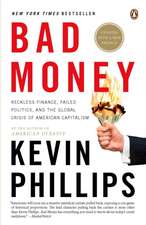European Political Economy: Issues and Theories
Autor Leila Simona Talanien Limba Engleză Hardback – 2 ian 2014
Preț: 1008.17 lei
Preț vechi: 1229.48 lei
-18% Nou
Puncte Express: 1512
Preț estimativ în valută:
192.91€ • 202.14$ • 159.48£
192.91€ • 202.14$ • 159.48£
Carte tipărită la comandă
Livrare economică 11-25 aprilie
Preluare comenzi: 021 569.72.76
Specificații
ISBN-13: 9781409452324
ISBN-10: 1409452328
Pagini: 312
Dimensiuni: 156 x 234 x 19 mm
Greutate: 0.68 kg
Ediția:2nd edition
Editura: Taylor & Francis
Colecția Routledge
Locul publicării:Oxford, United Kingdom
ISBN-10: 1409452328
Pagini: 312
Dimensiuni: 156 x 234 x 19 mm
Greutate: 0.68 kg
Ediția:2nd edition
Editura: Taylor & Francis
Colecția Routledge
Locul publicării:Oxford, United Kingdom
Notă biografică
Leila Simona Talani is a Reader (Associate Professor) in International Political Economy at King's College London, UK.
Cuprins
Introduction; Part 1 Theoretical Concerns: European political economy: an international political economy perspective on Europe; Mainstream approaches to European political economy; Critical approaches to European political economy. Part 2 Application of EPE Theories to Selected EU Issues: The making of EMU: political economy explanations of European monetary integration; Between growth and stability: assessing the monetary policy performance of the ECB in its first years from establishment; The stability and growth pact and the political economy of fiscal coordination in the Eurozone; The future of EMU: the crisis of the Eurozone within the context of the global financial crisis; The progress of the social dimension in Europe: spillovers or organised interests?; The political economy of the European employment strategy: an IPE perspective; The theory and practice of EU migration policy: an IPE perspective; Conclusion: the European political economy in the globalisation era; Index.
Recenzii
’The second edition of European Political Economy builds on the considerable strengths of the first. Talani has produced a comprehensive and accessible survey of the main political economic perspectives, both mainstream and critical, on European integration. Her application of theory to the key contemporary problems of the EU - and in particular the crisis of the Eurozone - is insightful and judicious. This book is a superb introduction to the key theoretical issues and policy debates surrounding the EU.’ Alan W. Cafruny, Hamilton College, USA ’The deep crisis of the European integration project, laid bare by the Eurozone debt crisis, raises the question of what light political economy can shed on the causes. Talani provides us with a thorough review of the study of Europe from a political economy perspective. A must read for anyone interested in European political economy, and particularly in the crisis and perspectives of monetary union and the European social model.’ Henk Overbeek, Free University Amsterdam, The Netherlands
Descriere
The first part of this book provides an overview of political science approaches to European political economy, both mainstream and critical ones. As such, it contributes directly to the current debate among scholars of political science and international political economy concerning the nature of the process of European integration. The second part provides alternative explanations of some European economic policy events - the ECB, banking regulation, fiscal coordination, the crisis of the euro-zone, social policy and unemployment - allowing the reader to assess the explanatory value of competing approaches.
















